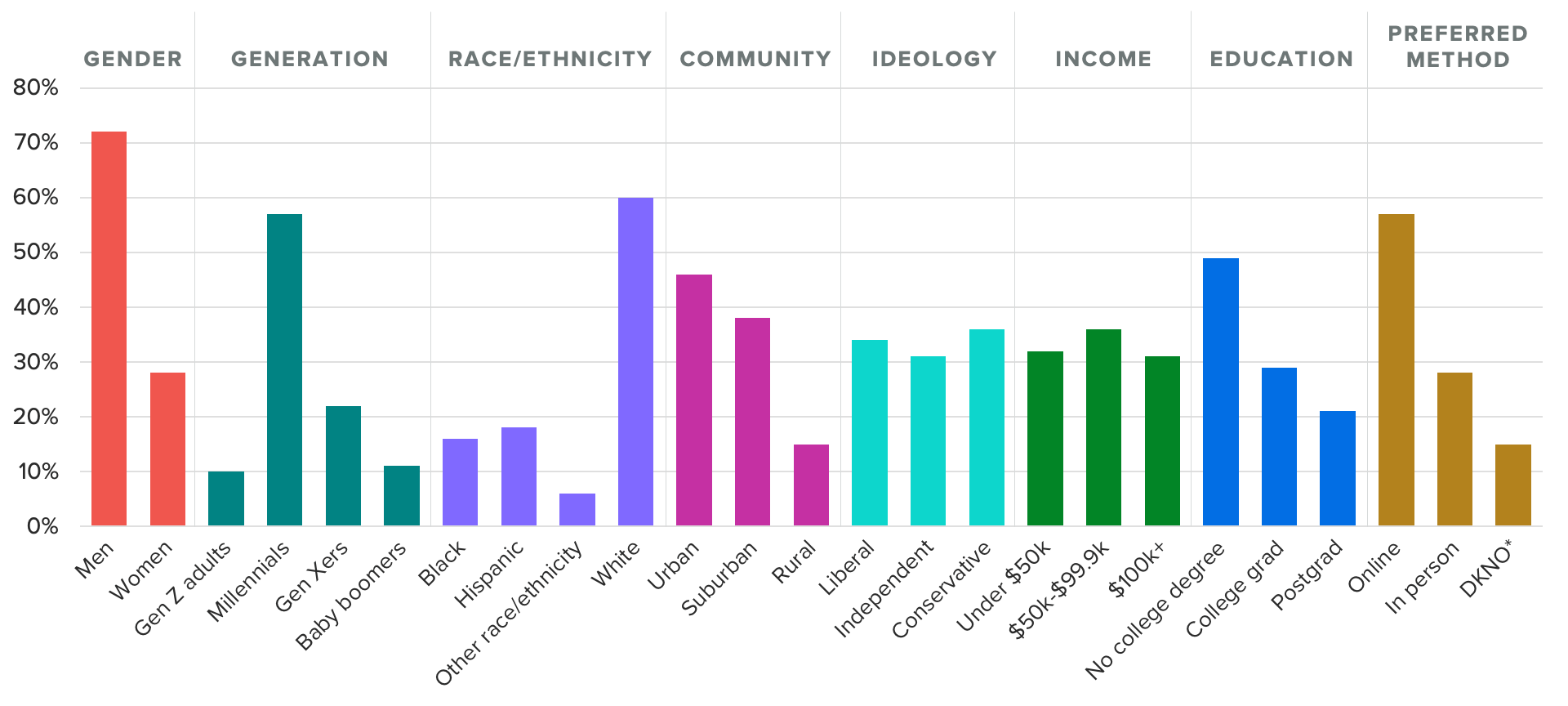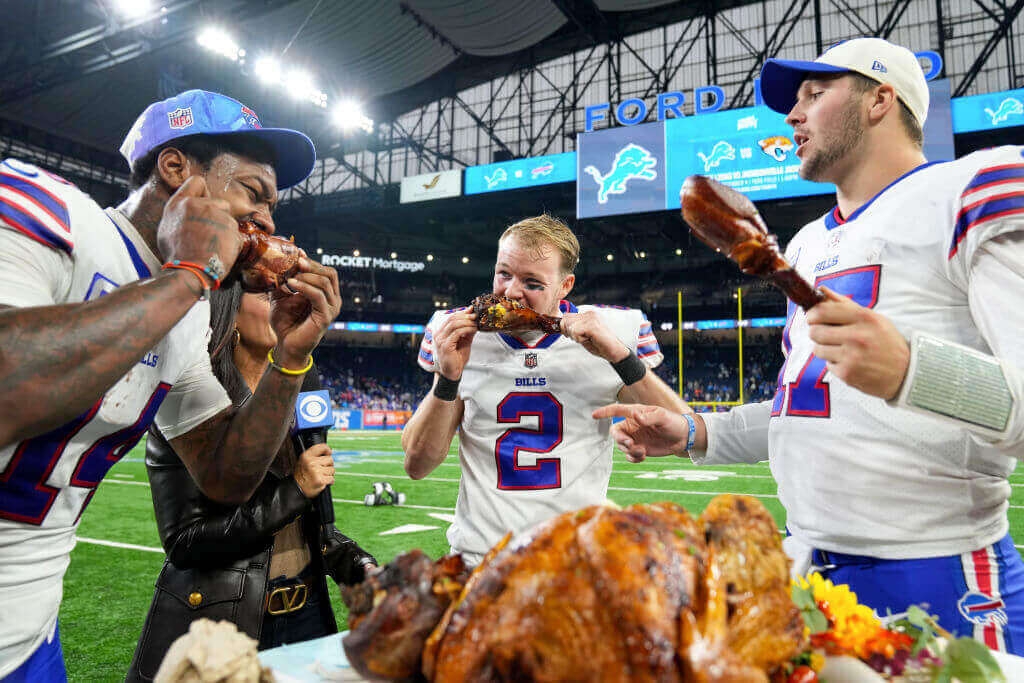Why Sportsbooks Face an Uphill Battle to Reach Non-Bettors

Key Takeaways
The skewed appeal of sports betting to men, millennials and high earners explains sportsbooks’ push to grow their user bases among women and Gen Z.
But a sea change in betting demographics won’t happen soon: The share of women who said they would not bet on sports regardless of the legality (74%) was much higher than for men (51%), while the equivalent share of Gen Z adults (62%) was much higher than for millennials (45%).
Accordingly, expanding into different demographics should only be seen as a long-term investment, though sportsbooks will likely focus more on appealing to women, given recent backlash over Gen Z-focused marketing pushes.
For the latest entertainment industry news and analysis, sign up for our daily entertainment briefing.
In the five-plus years since the Professional and Amateur Sports Protection Act was overturned, legalized sports betting has spread across the United States at breakneck pace. Consumers can already legally place sports bets online or in person in over 30 states, and last year gambling revenue rose to an all-time high of $7.5 billion, per the American Gaming Association.
In hopes of continuing the record-setting trend, major industry operators like FanDuel and DraftKings have been focused on broadening their appeal to women, who historically have been far less active in the sports betting scene. They’ve also partnered with universities like Michigan State to win over Gen Zers.
This is the right approach, but companies should temper their expectations because winning over both cohorts will be an uphill battle: New Morning Consult data shows that the share of women who said they would never bet on sports (74%) is much higher than for men (51%) and all adults 21 and over (63%), regardless of the activity’s legality. Additionally, Gen Z adults are much more likely than millennials to say they’d never bet on sports (62% versus 45%).
For sportsbooks, this signals that not enough has been done to make sports betting feel accessible to the average consumer. However, sportsbooks’ efforts to diversify their customer bases will likely favor drawing in women in the coming years, given the growing concerns about the promotion of underage gambling.
Sports bettors are disproportionately men, millennials and high earners
The typical sports bettor isn’t far from what you’d expect: Nearly 3 in 4 (72%) of those who said they bet on sports in the past month are men, with millennials overrepresented as well.
Some may assume bettors are more likely to identify as liberal given that Democratic governors have legalized online betting in huge sports gambling markets like New Jersey and Illinois. In reality, however, they’re pretty evenly split across the ideological spectrum, and lawmakers clamping down on betting has been a bipartisan affair.
Women Still Aren’t Sold on Sports Betting

Additionally, 31% of those who bet in the past month come from households earning at least $100,000 annually, which is relatively high when considering that viewers of traditional TV — the biggest appeal of which is live sports broadcasts — tend to skew lower-earning. It wouldn’t be surprising if we saw sportsbooks start to focus ad spending on free ad-supported streaming TV services, betting on lower-income adults to favor such options as paid streamers uniformly raise prices. For context, in May 40% of consumers who earned less than $50,000 reported using the free streaming service Tubi, while that figure was 29% for those earning $100,000 or more.
Much of the recent sports gambling backlash involves marketing toward underage consumers, which is why sportsbooks partnering with colleges now feels outdated. Instead of leaning on college campuses, sportsbooks will probably end up strengthening their connections with national sports bar chains like Buffalo Wild Wings and Dave & Buster’s, since the reach of these chains includes, but isn’t limited to, Gen Zers 21 and older. A chain might end up exclusively playing DraftKings’ new streaming service on certain TVs in its restaurants, for example.
It will be crucial for sportsbooks to focus on reaching more Gen Zers and middle-income consumers, in addition to women, given the latter group’s relatively high aversion to sports gambling.
Nearly 3 in 4 Women Say They’d Never Bet on Sports
While some may attribute the differences in willingness to bet to moral reasons, the share of women who oppose gambling as being morally wrong (61%) is actually lower than the equivalent share of men (67%). This suggests that a lack of familiarity with sports betting or sports broadcasts tailored to women’s interests is more likely the reason holding many back.
Sportsbooks should still give female athletes and women’s leagues a platform
The disparity between men’s and women’s willingness to bet is at least partly due to the dearth of women’s sports on primetime TV. The vast majority of the most-watched TV broadcasts in 2022 were NFL games, for example. And while the typical pattern of sports TV broadcast dominance may not change anytime soon, sportsbooks still have an opportunity to diversify their customer bases by elevating the right leagues and athletes.
Women are less likely than men to support the legalization of sports betting, but the share of women with no opinion on the matter is more than double the equivalent share of men.
Over Half of U.S. Adults Support Legalized Sports Gambling
Some women who are undecided on whether they support sports betting could be swayed by sportsbooks’ efforts to make women’s sports leagues more visible. FanDuel has already partnered with the WNBA and Women’s Tennis Association, but it could better publicize how these efforts have helped boost the growth of these women’s leagues. One additional step would be to create more custom content surrounding up-and-coming women’s sports stars like Caitlin Clark and Angel Reese to accelerate their rise.
These should be seen as long-term investments though, as there’s no guarantee that men’s and women’s interest in sports betting will reach parity in the coming years. Still, it’s fair to assume that some women who are currently undecided on sports betting may eventually warm up to it once leagues beyond the NFL, NBA and MLB gain more of the national spotlight.
After all, sports broadcasting rights are getting increasingly carved up for video streaming services, and even ESPN has plans to turn its entire network into a streaming service, potentially in a couple of years. This will boost the accessibility of sports broadcasts and likely help spur a natural uptick in gambling interest broadly across the United States — but it’s up to betting brands to ensure that they’re able to fully capitalize on this.
Kevin Tran previously worked at Morning Consult as the senior media & entertainment analyst.


